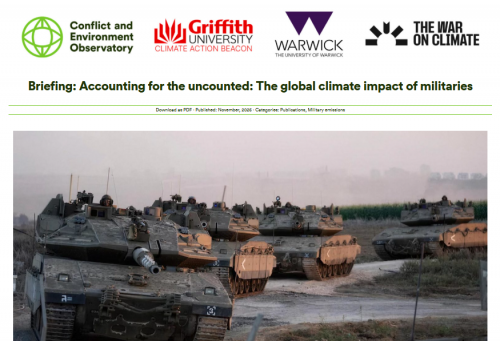
About this policy briefing
https://ceobs.org/briefing-accounting-for-the-uncounted-the-global-clima...
The world’s governments coordinate global climate action through the UNFCCC. But there is a missing piece: militaries do not have to report their emissions, leaving a huge blind spot in global climate action. As escalating military spending threatens global climate targets, the War on Climate’s second briefing outlines what the UNFCCC can do to address the global climate impact of militaries.
Recommendations
1. Include military emissions in global carbon accounting
The UNFCCC should implement, as a matter of urgency, mandatory military emissions reporting within National Inventory Reports, based on updated IPCC guidance for National Inventory Reports, which covers the full scope of military activity, including emissions from warfighting where relevant.
2. Commit to reducing military emissions
Governments should commit to ambitious and comprehensive military emissions reduction strategies in line with the Paris Agreement. These should be included within Nationally Determined Contributions to increase accountability.
3. Make strengthening defence compatible with climate action, diplomacy and peacebuilding
The global trend of diverting climate funds to facilitate rising military budgets should end. Instead, government budgets and international relations should focus on genuine human security, funding climate action, diplomacy, peacebuilding and conflict prevention.
CEOBS was launched in 2018 with the primary goal of increasing awareness and understanding of the environmental and derived humanitarian consequences of conflicts and military activities. In this, we seek to challenge the idea of the environment as a ‘silent victim of armed conflict’. Download our ‘About us‘ summary.
We are driven by the principle that access to reliable environmental information is vital in relation to armed conflicts. Indeed openness and transparency are critical when the environment becomes politicised.
CEOBS builds on six years of research and policy work by its predecessor the Toxic Remnants of War Project. The Project sought to identify new opportunities for collecting data on environmental harm and the human suffering it causes, and the means through which data could be used to inform greater protection for the environment, and for those who depend on it, before during and after armed conflicts. CEOBS’ work extends beyond the environmental consequences of war to also consider the role of environmental factors in triggering or driving insecurity.
We intend for this website, which aggregates information on multiple conflicts and topics, to be a resource for policy-makers, researchers, activists and journalists interested in the environmental dimensions of armed conflicts.









